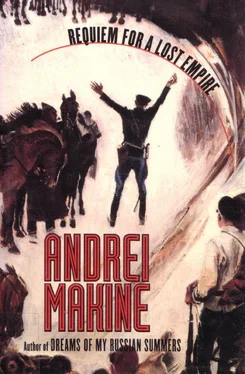It was from that infant, no doubt, that I inherited both the fear of naming things and the painful temptation to do so. An infant, borne away one night by the white-haired woman who, as she made her escape, did her utmost for him not to be aware of it. At first she was successful, until she came to cross a narrow suspension bridge above the stream. The infant was dozing with open eyes, and did not seem surprised. He recognized the warmth of the woman's body, the shape and strength of the arms holding him tight. Despite the darkness, the air had the same scent as usual, the pleasantly sharp tang of dead leaves. Even the mountains, now black, and the trees tinted blue by the moon did not amaze him: often the sun's fierce light at noon would seem to turn the ground and the foliage around their house black.
But halfway across the little bridge, as it sways on its ropes, suddenly everything changes. The infant does not see the worn slats on which the woman is moving falteringly forward, nor the gaps left by the missing ones, nor the phosphorescent foam on the stream. But he senses, without knowing why, that the woman carrying him is afraid. And this fear in an adult is as strange as the abrupt maneuver by which she grips the collar of his little shirt in her teeth, reaches out with her arms to cling to the ropes and leaves him dangling in the dark air. Her stride-almost a leap-over the broken slats is so long that the child feels as if he is flying. The pebbles on the bank crunch under the woman's feet. She unclenches her jaw, takes the infant in her arms again. And hastily puts her hand over his mouth, anticipating the cry that this being, who is beginning to understand, was about to utter.
For the infant their nocturnal escape coincided with that unique moment when the world becomes words. Only the day before everything was still fused together into a luminous mixture of sounds, skies, familiar faces. When the sun went down, his father would appear on the threshold of the house-and the joy of the setting sun was also joy at seeing this smiling man whom the sun brought home, or was it, perhaps, the father's return that sent the sun plunging into the branches of the forest and turned its rays copper? His mother's hands smelled of clothing washed in the icy waters of the stream, a fragrance that scented the first hours of the morning, mingling with the breeze that blew down from the mountains. And this flow of air was inseparable from the quick caress with which his mother's fingers strayed into his hair when she woke him. Occasionally, amid this tissue of lights and scents, a rarer note: the presence of the woman with white hair. Sometimes her coming coincided with the retreat of the last snows toward the mountaintops, sometimes with the blooming of those great purple flowers on their tall stems that seemed to light up the underbrush. She would come and the infant would notice an extra clarity in all that he saw and breathed. He came to associate this mysterious happiness with the little suspension bridge that the woman used to cross when she spent a few days in their house.
On that particular night it was the same woman, gripping his shirt collar in her teeth and carrying him over the little bridge as it set snares for them with its broken slats. When she collapsed amid the thickets she just had time to stifle the infant's cry. He struggled for a second, then froze, alarmed by quite a new sensation: the woman's hand was trembling. Silent now, he observed the world disintegrating into objects he could name, and which, once named, hurt his eyes. This moon, a kind of frozen sun. This bridge, a secret herald of happiness no longer. The smell of the water, no longer associated with the coolness of his mother's hands. But above all, this woman, sitting in the darkness, her anxious face turned toward impending danger.
He recalled that their whole journey, begun well before sunset, had been nothing other than a slow slide toward a world riven by strangeness and fear. They had started by walking through the forest, up hill and down dale, at a pace too fast for an ordinary stroll. The sun had gone down without waiting for his father's smile. Then the forest had thrust them out onto a level, open space and the child, not believing his eyes, had seen several houses lined up along a road. Before that there had only been one house in the world, theirs, hidden between the stream and the wooded flank of the mountain. The house, unique, like the sky or the sun, impregnated with all the scents given off by the forest, in tune with the yellowing of the leaves that covered its roof, attentive to changes of the light. And now this street lined with houses! Their multiplicity hurts his eyes, provokes a painful need to respond. The word "house" forms in the infant's mouth, leaving an insipid, hollow taste. They spend a long while in an empty courtyard behind a fence, and when the child grows impatient and utters the word "house," to indicate that he wants to go home, the woman hugs him to herself and stops him from speaking. Over her shoulder he becomes aware of a group of men. Their appearance leaves him totally baffled. To himself he says "people," the word he had heard spoken at home with a slight anxious hesitation. People, the others, them… Now he sees them in flesh and blood, they exist. The world is growing bigger, teeming, destroying the singularity of those who hitherto surrounded him: his mother, his father, the white-haired woman. By saying "people," he feels he has done something irreparable. He closes his eyes, opens them again. The people disappearing at the end of the street all look alike in their dark jackets and pants and their long black boots. He hears the woman heave a deep sigh.
During the night, after crossing the little suspension bridge, words assault him, force him to understand. He understands that what was missing from the houses in the village, where they have just seen "people," was the great stone disk. These houses were empty, their doors were wide open and no glint of mica shone in the gloom of their rooms. A sudden doubt assails him: what if the house has no need of the gray rock at its heart? What if their own house was not a proper house at all? The conversations between adults that he used to retain in his memory as simple rhythms now bristle with words. He understands scraps of these words, remembered in spite of himself. The story of the rock, its appearance, its strength. They often spoke of it. So, it was an aberration: even his mother's action one night when she fixed a candle in the long fissure on the slab of rock.
All at once his family's life seems to him very fragile in the face of this threatening world, where the houses get by without granite disks and the inhabitants all wear black boots and vanish up a road that has no ending. The child senses confusedly that it is because of these "people" that their family has been obliged to dwell in the forest and not in the village where the others live. He goes on deciphering the words he recalls from the adults' conversations and is more and more afraid. He has not seen his parents since the sunshine of the afternoon, a separation, he senses, that could last indefinitely in this world without limits.
The hand smothering his cry seems unfamiliar, for it is trembling. He remains silent for a moment. In the darkness below their hiding place footfalls can be heard on the pebbles at the stream's edge, voices, a brief metallic grating sound. The infant struggles, he is about to free himself from the hand restraining his sobs, to cry out for his mother; he has recognized his father's voice down there. He wants no more of this world where everything is booby-trapped by words. He does not want to understand.
Through the breathlessness of his struggles he suddenly hears a melody. A hardly audible music. A soft, almost silent singsong that the woman murmurs in his ear. He tries to grasp the words. But the phrases have a strange beauty, devoid of meaning. A language he has never heard. Quite different from that of his parents. A language that does not require understanding, just immersion in its swaying rhythms, in the velvety suppleness of its sounds.
Читать дальше










